Dentures – Lewisville, TX
Fill the Gaps in Your Smile For Good
 Did you know over 120 million Americans struggle with tooth loss? So, if you are missing one, a few, or an entire arch of teeth, you’re certainly not alone. Fortunately, Dr. Capehart can restore your smile, bite, and speech with partial, full, or implant-retained dentures in Lewisville! To learn more about this modern solution to tooth replacement, don’t hesitate to contact our office.
Did you know over 120 million Americans struggle with tooth loss? So, if you are missing one, a few, or an entire arch of teeth, you’re certainly not alone. Fortunately, Dr. Capehart can restore your smile, bite, and speech with partial, full, or implant-retained dentures in Lewisville! To learn more about this modern solution to tooth replacement, don’t hesitate to contact our office.
Who’s a Good Candidate for Dentures?

Dentures are an excellent option for patients who are missing several, most of, or all of their natural teeth. Depending on how many teeth you are missing and where they are located, a customized plan can be made just for you. If you are currently struggling with any dental problems, like tooth decay or gum disease, this will need to be addressed and eliminated before you are able to get dentures. The health of your smile is always our number one priority!
Effects of Missing Teeth

Tooth loss can be caused by a variety of different factors. The most common causes of missing teeth are tooth decay, gum disease, and injury. According to the American Academy of Periodontology, there are several negative consequences of missing teeth, including facial sagging, difficulty speaking, trouble eating, and low self-esteem. The good news is that dentures can positively impact all of these issues, therefore improving your quality of life.
What Qualifies You for Dentures?

Dentures are great for patients who have experienced significant tooth loss but have healthy gum tissue and a sufficient jawbone. If you are getting dentures, you must also be committed to your dental health routine and willing to properly care for your new smile.
The number of teeth that you are missing will ultimately determine which type of denture you get. One of the great things about dentures is the fact that they are more affordable than other tooth replacement options, like dental implants. This makes them ideal for patients who aren’t able to invest lots of money into their smile at this time.
Alternative Tooth-Replacement Options
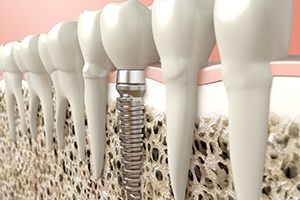
If you aren’t a good candidate for dentures or they aren’t something that you are interested in, you might want to look at some of the other tooth replacement options that we have to offer.
- Dental Bridges: Dental bridges work by “bridging” the gap in your smile. This method is ideal for patients who are only missing one or a few consecutive teeth. A bridge requires healthy teeth surrounding the missing tooth for optimal support.
- Dental Implants: A dental implant is a titanium, screw-like post that is surgically inserted into the jawbone. Patients must have a solid bone structure and be able to undergo a minor surgical procedure. This option has a higher upfront cost, but it is also permanent.
Why Replace Missing Teeth?

Aside from the cosmetic repercussions, one or more missing teeth can negatively affect your general and oral health. In fact, roughly 25% of bone loss occurs within one year of a missing tooth. Not only can this result in your adjacent teeth shifting, but it also can compromise your youthful facial structure. Plus, the gap in your smile can make it difficult to maintain a balanced diet, resulting in nutritional deficiencies and indigestion. Therefore, it’s best to speak with our dentist in Lewisville when you first lose a permanent tooth.
What Are My Treatment Options?

If the word “dentures” brings to mind visions of unnatural-looking, obvious prosthetic teeth, then you haven’t been introduced to the modern ones used today! Depending on your unique dental needs, Dr. Capehart will recommend one of the below solutions to rebuild your full smile:
Partial Dentures
A partial denture is ideal for patients who are missing teeth but still have some of their natural ones intact. With this solution, the custom-made teeth and a gum-colored base hide the metal framework that discreetly clasps onto your remaining teeth, securely holding it in place. Since they are completely removable, maintenance of your oral health and your appliance is hassle-free!
Full Dentures
For patients who are missing an entire arch of teeth, a full denture is best. The same gum-colored acrylic base and all-ceramic teeth are utilized; however, a combination of suction and adhesive is used to keep the denture snugly against your gums. That way, you can chew, smile, talk, and laugh with minimal movement!
Implant-Retained Dentures
Implant-retained dentures are where state-of-the-art dental implants and dentures collide. By anchoring your new teeth in place with dental implants, you can enjoy all the benefits they are known for, like jawbone preservation, unmatched durability, and a 10+ year lifespan.
Understanding the Cost of Dentures

Since each patient’s smile is unique, so are their dental needs. However, there are a few all-encompassing factors that influence the answer to this question, like which denture type you are getting, how many teeth are being replaced, and if your dental insurance plan covers a portion of your treatment. Don’t worry – we will go over all these questions with you at your initial consultation and do everything we can to make sure your new teeth are affordable!
Factors That Affect the Cost of Dentures

Three major factors that influence the cost of dentures in Lewisville:
- Preliminary Treatment – Dr. Capehart may determine that you need to remove remaining teeth before you can get dentures. This extra step will add to your costs but boost your chances of successful denture treatment.
- Type of Denture – Implant dentures typically cost more than their traditional counterparts. In addition, a full denture may cost more than a partial.
- Denture Material – Acrylic and porcelain are commonly used to craft artificial teeth. While both types of material provide function and beauty, porcelain may cost more.
When it comes to replacing missing teeth, it’s important to remember that cheaper usually does not equal better. The lower the price tag, the lower quality your restoration may turn out to be. You’ll be wearing your dentures every day, so you should invest in a restoration that is both durable and fits comfortably.
Are Implant Dentures More Expensive?
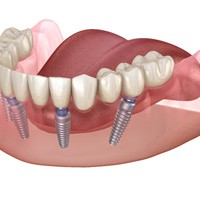
Yes, implant dentures typically cost more than traditional dentures. However, there are important factors that contribute to the price difference. Unlike traditional dentures that rest on top of gums, dental implants fuse directly with the jawbone. In this way, implant dentures provide superior support, prevent slipping, and offer greater chewing power. Implant dentures also look more permanent and lifelike to the naked eye. In addition, dental implants can last for decades with proper care. Traditional dentures, on the other hand, usually must be replaced every five to seven years.
Does Dental Insurance Cover Dentures?

While every dental insurance plan is different, most cover around 50% of the cost of dentures in Lewisville. Before committing to dentures, be sure to contact your insurance provider to confirm your coverage. Our knowledgeable team will be happy to help you understand the ins and out of your dental insurance. We always work to maximize our patients’ dental insurance benefits and we’ll even file the paperwork on your behalf.
Other Options for Making Dentures Affordable
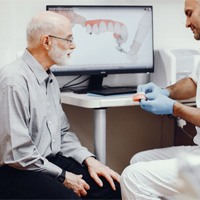
For those patients who do not have traditional dental insurance plans, we offer an in-office savings plan to help offset the cost of dentures. The Capehart Care Plan covers all preventive maintenance services for a year at no additional cost. In addition, all additional treatments are available at a discount of at least 10%.
We are also happy to connect our patients with flexible financing through CareCredit. A trusted partner, CareCredit allow patients to break down the cost of dentures over time. With just a few clicks through our website , you can qualify for a low-to-no interest payment plan with CareCredit.
To learn more about the cost of dentures and different payment options, schedule a consultation with Dr. Capehart, an experienced denture dentist in Lewisville.
How Dentures Are Made

Enjoying beautiful, natural-looking dentures requires a unique process. To fully appreciate the care and attention that goes into your new smile, you must understand the various steps that are taken to produce these replacement teeth. This is why we at Capehart Dental of Lewisville have provided a brief breakdown of how dentures are made so that you can more clearly see just how much time and effort is required to create your one-of-a-kind smile.
What Are Dentures Made Of?
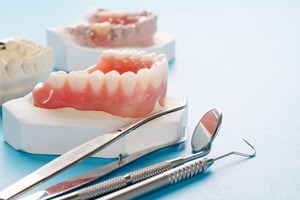
Dentures require two parts: the base and the artificial teeth that are placed into the base.
- The Base – This is commonly created using gum-colored acrylic that serves as the foundational support for your artificial teeth. It is often held in place by natural suction (full denture) or metal clasps (partial denture).
- Artificial Teeth – These are non-porous teeth made of porcelain or resin that sit on top of the base to fill in the gaps left behind by real teeth. There can be multiple along a base or an entire arch.
The Denture Creation Process
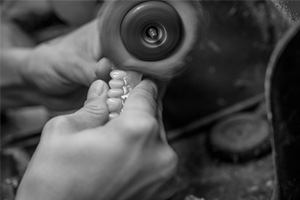
No two dentures are the same, so you can expect that your dentures will be custom-made for your mouth. After capturing measurements and digital images of your mouth, our team will take impressions and send them to a nearby dental lab for fabrication.
A plaster model will be crafted to help with the creation of your dentures. Building a wax replica of your gumline, the technicians will then place the artificial teeth along the base. This set of wax dentures will then be returned to our dental office for the initial fitting. If everything looks fine, it will be returned to the laboratory, where technicians will boil the dentures in a flask. After adding plaster to help secure the shape, the hot water will melt away any wax before small holes are created in the teeth.
Acrylic is then injected into the flask so that it replaces the wax and rebuilds the shaped base. Once the plaster is removed, the dentures are placed in an ultrasonic bath. This helps to remove any plaster before the technicians remove excess acrylic.
The final step is to polish the denture so that it appears natural.
Adjusting to Your New Dentures

It is not uncommon to experience some slight discomfort when initially receiving your dentures. Your mouth, particularly your tongue, gums, and any existing teeth, must become accustomed to the foreign object in your mouth. You may notice a slight lisp develop, and you may struggle with trying to eat certain foods.
During this initial phase, you’ll want to practice speaking slowly and reading aloud so that you can begin to form words and sounds with your dentures that will, over time, become normal. You’ll also want to practice chewing your food so that your dentures do not shift or become uneven inside your mouth.
Before you know it, you’ll be eating and speaking with dentures without any problem, as the adjustment phase typically does not last too long.
Benefits of Dentures

If you are missing teeth, it can be much more difficult to complete tasks you once found easy, like speaking clearly and thoroughly chewing your food. Fortunately, you don’t need to go the rest of your life without your pearly whites. Dentures can help you reclaim your smile with all of the different benefits they provide. Here are some of the things you can look forward to.
Psychological Benefits

It is often difficult for edentulous people to accept tooth loss. This can lead to negative effects on self-esteem. Those who are insecure about tooth loss are less likely to engage in social activities. By restoring the appearance and function of one’s smile with dentures, patients are likely to experience an increase in their confidence, therefore reducing anxieties about appearance, speech articulation chewing ability, and more!
Clearer Enunciation

When you’re missing teeth, it can be much more difficult to speak clearly. In order to pronounce words correctly, your lips and tongue need to be properly positioned. When you can’t touch your tongue to your teeth, some words are nearly impossible to say. Dentures act as your missing teeth, therefore allowing you to enunciate more clearly while speaking.
Improves Nutrition

Nutritious foods come in a variety of different textures. Some veggies, fruits, and healthy proteins are tough. When you can’t chew them thoroughly, you’re more likely to experience indigestion and malnutrition. By improving your ability to chew with dentures, you can enjoy a more expansive diet with plenty of nutritious foods!
Preserves Oral Health

For those who still have natural teeth, dentures can keep them from shifting to other areas of the mouth. Dentures are also able to bear some of the weight of regular chewing, therefore reducing the wear and tear of your existing teeth over time.
Expands Opportunity

The first impression you give off is very important – especially when it comes to your career and creating social circles. It certainly doesn’t hurt to improve and enhance the appearance of your smile. After all – it is one of the first things people notice about you!
Dentures Aftercare

After you receive your dentures, how will you take care of them? Maintenance might not seem like a big deal now, but if you’re frequently visiting for repairs or replacements, you’ll notice the impact! Below, we’ve outlined some general information about how best to care for your dentures. These tips will help them last longer and save you time and money in the long run, so we’d be happy to answer any questions you might have!
Removable Dentures
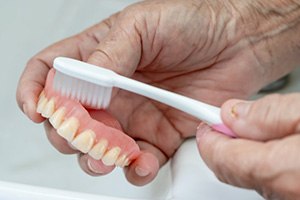
Remove After Eating
Whenever you eat with your dentures, there’s a chance for food particles and bacteria to get stuck underneath them. If this debris sits for too long, it can cause discomfort or even damage your prosthetic. That’s why we recommend removing and rinsing your dentures after each meal.
Clean Your Restoration
Cleaning is a huge part of keeping natural teeth healthy. While your dentures aren’t organic, bacteria build up can still cause problems for supporting oral tissue. It’s still important to visit our office for a professional cleaning, even if you have a full set of dentures!
To mitigate bacteria build up in your day-to-day life, you’ll have to keep up with regular brushing. Remove your dentures at least twice daily for these thorough cleans and be sure to use a soft-bristled toothbrush and hand soap.
Keep Your Dentures Safe
Sometimes, accidents just happen! Still, there are measures you can take to protect your dentures from sudden damage. Storing them a secure case when they’re not in your mouth, for example, avoids the possibility of them getting crushed or exposed to a countertop full of gross bacteria.
Remove When You Sleep
Did you know that your gums need circulation in order to stay healthy? Dentures put pressure on them that restricts blood flow, which is fine in periodic doses. However, wearing your prosthetic while you sleep doesn’t give them much chance to breathe – literally.
Notice Changes
If you notice changes to your dentures or oral wellness, let us know in a timely manner. We don’t want you to be uncomfortable due to ill-fitting dentures or mouth sores. Plus, certain symptoms, like inflamed gums, could indicate a serious oral condition. Let us take a look, and we’ll look after your dental health!
All-on-4 Dentures

Since all-on-4 dentures aren’t meant to be removed, caring for them is a little different. Twice daily brushing is still essential, but so is flossing at least once per day and making sure to clean underneath your appliance. A sulcus brush is smaller than a regular toothbrush and can help you reach those tight nooks and crannies.
Dentures FAQs

Now you know all about the importance of replacing missing teeth, the different types of dentures in Lewisville, and the benefits they come with. But there is still a bit more to learn before determining whether this tooth replacement option is the best one for you. That’s why we have listed a few of the most frequently asked questions below. If you’d like to speak with our team directly about any questions you have, schedule an appointment!
How Do I Care For My Dentures?
Caring properly for your dentures is the key to prolonging their lifespan, as well as your new and improved smile and bite. Priority number one is to keep them free of bacteria, plaque, and food particles by brushing them daily with a soft-bristled toothbrush and denture-friendly toothpaste. To prevent them from breaking, make sure to handle them with care by keeping them in a protective case when they aren’t in use. And, of course, visit our dentist in Lewisville, Dr. Capehart, every six months for dental checkups, cleanings, and adjustments.
Can I Eat Normally With Dentures?
Dentures today aren’t only lifelike in their appearance; they are lifelike in function as well. With that being said, it may take some time to adjust to your prosthetic teeth, making soft foods an ideal option in the beginning. Once you’ve become accustomed to the way they move, you’ll be able to work your way back up to your normal diet. Just do your best to avoid especially hard or chewy foods, like peanut brittle and ice. Like your regular teeth, all it takes is one wrong bite for a chip or crack to occur.
Can I Sleep With My Dentures?
In theory, yes. However, it’s a good idea to give your gums (and your dentures!) a rest as you sleep. Instead, place them in a glass of a dentist-approved cleaner overnight. Not only will this preserve their shape, but it will keep them in pristine condition. By the morning, they will be fresh and ready for a full day of talking, chewing, and laughing.
Will My Partial Dentures Match My Natural Teeth?
Whether you are missing several teeth in a row or scattered throughout your mouth, you may be wondering if your prosthetic teeth will look obvious or obtrusive compared to your natural ones. The answer? Absolutely not! Each set of dentures are custom-made, ensuring the shade, size, and shape blends in seamlessly with your smile. In short, the fear of dentures not looking natural shouldn’t stop you from getting the restorative care you need.
How Long Do Dentures Last?
Typically, dentures last anywhere between 5-10 years; it really depends on how you care for them and your oral health. Poor dental habits, like using tobacco products and neglecting your dental hygiene regimen, can significantly shorten their lifespan. In contrast, practicing proper prevention can make them last even longer than ten years.
